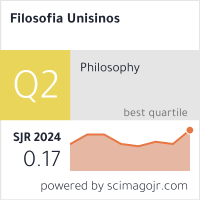Desire and cognition in Aristotle’s theory of the voluntary movements of animal locomotion
DOI:
https://doi.org/10.4013/fsu.2017.182.01Resumen
Two of the main controversies that have occupied specialists who dedicate themselves to the study of Aristotle’s theory of animal locomotion are the controversy about the form of the cognition through which an animal apprehends an object as an object of desire, and the controversy about the function of cognition in Aristotle’s explanation of the voluntary locomotion of animals. In this article, I present an interpretation about the ways in which desire and cognition are articulated in Aristotle’s theory according to which an animal apprehends an object as an object of desire through an incidental perception of this object and, contrary to what most seem to think, this perception does not have the same function in the production of these movements. If what is said here is correct, in some cases this perception is responsible for the generation and the orientation of a desire, but in other cases it is only responsible for its orientation.
Keywords: Aristotle, voluntary, movement.
Descargas
Descargas
Publicado
Cómo citar
Número
Sección
Licencia
Concedo a revista Filosofia Unisinos – Unisinos Journal of Philosophy o direito de primeira publicação da versão revisada do meu artigo, licenciado sob a Licença Creative Commons Attribution 4.0 (que permite o compartilhamento do trabalho com reconhecimento da autoria e publicação inicial nesta revista).
Afirmo ainda que meu artigo não está sendo submetido a outra publicação e não foi publicado na íntegra em outro periódico e assumo total responsabilidade por sua originalidade, podendo incidir sobre mim eventuais encargos decorrentes de reivindicação, por parte de terceiros, em relação à autoria do mesmo.










